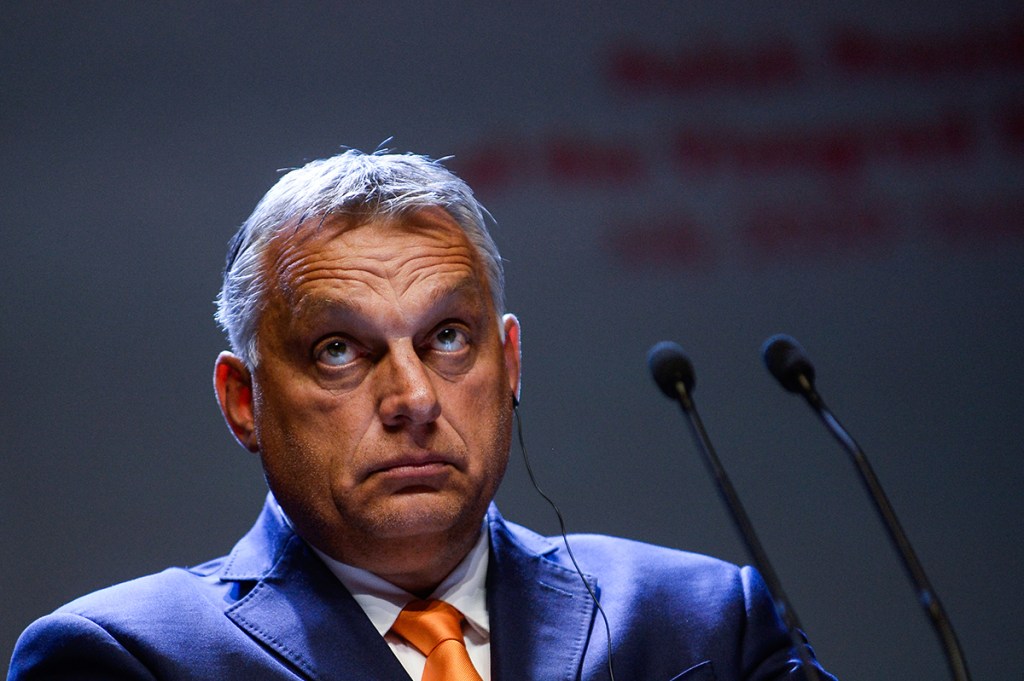Other EU countries ‘should not interfere in the affairs of Hungary,’ Czech president Miloš Zeman said on Sunday in support of Viktor Orbán’s controversial new anti-LGBT reforms. As international condemnation of the country’s new LGBT law mounts, Zeman threw his weight behind the Hungarian prime minister, saying he ‘can see no reason to disagree with him’ in his stance on LGBT rights.
The Czech president’s words came as the latest blow in the EU’s increasingly bitter culture war between west and east, with blame for the confrontational environment being placed by Brussels on rebel nations such as Hungary and its Visegrád Four ally Poland. Yet the EU is, in fact, now reaping the whirlwind for having introduced a ‘rule of law’ budget instrument which aims to punish non-conformity with its own legal, ethical and cultural norms.
In December, the EU attached a rule of law mechanism to its pandemic recovery budget, making it possible for funds to be withheld from nations perceived to be violating the bloc’s core principles. The instrument was a new, harsher element in a wider rule of law framework, which the EU describes as being intended to ‘prevent emerging threats to the rule of law…through dialogue with the EU country concerned’.
Yet the new budget instrument didn’t look so benign to the countries likely to be targeted by sanctions. The ability to financially punish member states for violating cultural and ethical standards was pushed for by the European Parliament — the EU’s most belligerent institution when it comes to cultural and political non-conformity — and staunchly opposed by Hungary and Poland.
True to form, the EP is now threatening to take the European Commission to court over its tardiness in initiating rule of law proceedings against the ‘conservative autocrats’ ruling those two miscreant member states.
In this context, it is unsurprising that cultural tensions have only become greater since the rule of law budget instrument was introduced. If there was one lesson for the EU to take away from Brexit, it was surely that national cultures and sovereignty are sensitive topics to be handled with care. Yet Brussels is now wading into member states’ internal affairs wielding the threat of economic sanctions. In so doing, it is taking a blunt instrument to highly delicate issues, and playing into the hands of conservatives throughout central and eastern Europe.
The consequences of this hubris are now becoming clear. Rather than forsaking their controversial reforms, Hungarian and Polish leaders are doubling down on their reassertion of Christian conservative values and national sovereignty.
A new Hungarian law to limit the ‘promotion’ of LGBT-positive content in education and the public sphere, portrayed by Orbán as an effort to protect families and children, has sparked international condemnation. Polish prime minister Mateusz Morawiecki has meanwhile asked the country’s Constitutional Tribunal to evaluate whether or not EU law should have primacy over domestic law. If the judges on the Tribunal — many of whom were appointed by Morawiecki’s Euroskeptic government — rule against the primacy of EU law, the implications for Poland’s status within the bloc would be far-reaching.
As night follows day, these renewed cultural and legal challenges have led to further escalation from the EU’s liberal member states. Dutch prime minister Mark Rutte said he believes Hungary ‘has no business being in the European Union anymore’ due to its new anti-LGBT law, while Munich mayor Dieter Reiter did his utmost to light up the Allianz Arena in rainbow colors to welcome the Hungarian soccer team at a recent European Championship clash. EU Justice Commissioner Didier Reynders has said the European Commission is ‘ready to go to court’ over the Hungarian reforms.
The Commission meanwhile issued a stern rebuke to Poland in an attempt to stop its constitutional ruling on the primacy of EU law. Polish politicians reacted with fury, accusing EU officials of a ‘colonialist attitude’ and comparing their stance with that of the Soviet Union towards its satellite states, claiming Moscow at least ‘kept up the appearance’ of Polish sovereignty during the communist era.
Inevitably, this divisive atmosphere is now forcing other leaders in the region to take sides. While expressing his support for Orbán on Sunday, Czech president Zeman raised the stakes still further by describing transgender people as ‘disgusting’, calling for a march of heterosexual people to demonstrate the ‘pointlessness’ of LGBT demonstrations, and claiming to be ‘completely annoyed by the suffragettes, the #MeToo movement, and Prague Pride’.
The president’s harsh words demonstrated how a confrontational environment, created by the EU’s own rule of law instrument, is now pushing conservatives and liberals to extremes, rather than preventing disputes. By encouraging the belief that conservative member states deserve punishment, and by threatening to use economic force to interfere in member states’ domestic affairs, Brussels has flown too close to the sun. It now remains to be seen how far it could fall.
This article was originally published on The Spectator’s UK website.

























